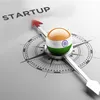India ranked third in global startup index, says Economic Survey
The year 2018 was dominated by food tech startups according to Economic Survey for 2018-19 even as it acknowledged the ecosystem was impacted due to policy ambiguity.
India has been ranked third in the global startup ecosystem, and the year 2018 was dominated by foodtech startups, says the Economic Survey for 2018-19.
According to the Economic Survey, the Indian startup ecosystem witnessed a funding of $7.5 billion in 2018 as compared to $4.3 billion in 2017 though the number of deals has actually saw the decline in this two year period.

The retail segment of startups saw the highest investments in 2018 at $2.09 billion followed by food at $1.65 billion. The year also saw foodtech companies like Swiggy and Zomato turning into Unicorns.
However, the Economic Survey also acknowledged that policy ambiguity is creating hurdles for the startups in the country.
“Startups and innovative ventures face significantly greater uncertainty than traditional “brick-and-mortar” firms. Yet, policy ambiguities that create collateral damage for genuine risk-takers can affect investments by dampening the animal spirits in the economy,” the Survey said.
The Survey stressed that it is important to continue the creation of an ecosystem for private investment, especially in the new economy, to enable the virtuous cycle of investment, demand, exports, growth and jobs.
“Growth in the new economy cannot be fostered without an ecosystem that rewards innovation and entrepreneurship,” the survey noted.
The government also announced the “Start-up India, Standup India” initiative on August 15, 2015, which aims to create an ecosystem that is conducive for the growth of startups. According to Economic Survey, as on March 1, 2019, 16,578 new startups were recognised across 499 districts in India.
Among the distribution of startups, Maharashtra, followed by Karnataka and Delhi, are among the top ten performers in terms of State-wise distribution of recognised startups in India.
As per industry-wise distribution of recognised startups, IT Services accounted for around 15 percent, followed by Healthcare and Life Sciences at around nine percent, and education at eight percent.










